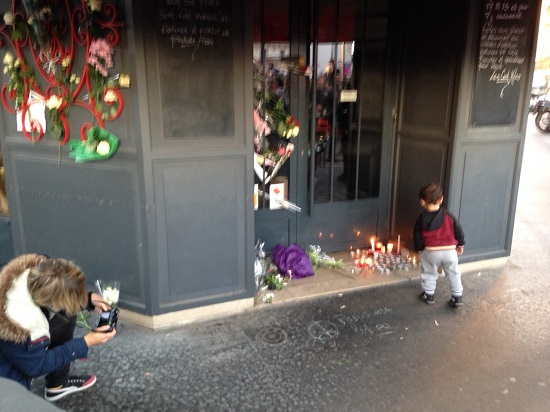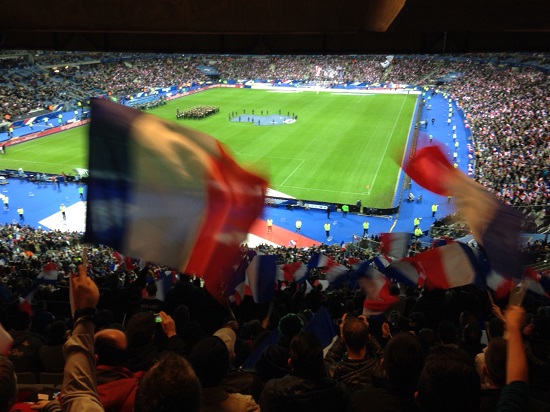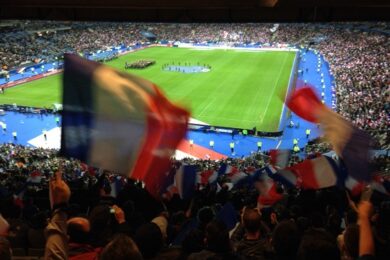I’ve maintained for a long time that you’d have to be very unlucky to be killed in a terrorist attack, and yet they just keep getting closer and closer. On the July 7, 2005 I took the tube through King’s Cross on the way to Serbia for a festival, and upon landing for a connecting flight in Vienna my phone jammed with concerned messages from friends checking I was still alive; traversing across London an hour or so before the bombs went off on the Underground felt too close for comfort. Then the Charlie Hebdo killings in January were literally even closer to home, as I live a short walk away from the offices in the 11eme of Paris. Then on Friday November 13 I found myself at the Stade de France for an international friendly football game between Euro 2016’s host nation and Germany as people blew themselves up at the perimeter gates. "There is no such thing as paranoia,” said Hunter S. Thompson, “your worst fears can come true at any moment.”
I thought the first explosion was a firecracker, despite my partner’s panic. “That was a bomb,” she said, and I tried to laugh it off. The second explosion shook the stadium. Peering through the grid at the top of the stand, Claire could see security running pell mell and became overwhelmed with a sense that something wasn’t quite right. Reluctantly I agreed to leave the game with her 25 minutes in, while people waved tricolor flags and sang, “Allez les bleus” oblivious. I was still sure we were allowing paranoia to spoil a perfectly good football match, but as we attempted to leave we were gathered up by the bomb squad and taken to one side. The gates all around the stadium were shut and we were instructed to remain where we were. Anywhere else was too dangerous. Not a lot of people knew it but we were in lockdown.
“Those were actual bombs?” we said in disbelief.
“Yes.”
We couldn’t quite comprehend that firstly there were bombs, and secondly that they were telling us there were bombs. Perhaps something had got lost in translation.
“Actual bombs?”
“Yes. It’s safer if you stay here.”
A kindly security guard came over to talk to us. He was visibly shaken, having been blown off his feet at either Entrance A or Entrance D where the first two explosions had occurred (a third went off during the second half). His ears were ringing and he pointed to his head as if to signal concussion. “My friend has been taken in an ambulance,” he added. He mentioned something about his leg being injured, or maybe even blown off, in the explosion. It’s difficult in hindsight to be entirely sure given the confusion that had descended upon us. Then he said there was a gunman on the loose on the other side of the stadium who’d opened fire in a bar. Whether this actually happened – or whether the information was garbled and what he was referring to was the suicide bomber in McDonalds – again is unclear, but at the time it became abundantly clear that it was safer to stay where we were.
How did we know things that virtually nobody else in the stadium seemed to be aware of? Security knew. Another distressed couple stood near us who’d had the same scared reaction to the explosions and had tried to leave knew. The President it transpired knew, the managers of both teams (who kept the news from their players at halftime) knew. And we knew. It became apparent to me that the fewer people who were in on it, the less likely there’d be a stampede, which could and would be deadly. Those who tried to evacuate the stadium would have to be told.
Olivier Giroud scored towards the end of the first half and while everyone cheered, we were numb, neutral, neutered. What were we doing there anyway? At half time a man was brought out from the stands holding a “golden ticket” and was photographed with his family, all smiling, elated, again oblivious. We were aware that death and carnage were in the air – although we had no idea of the full extent just yet – and suddenly it felt like we were characters in a living nightmare, in some dystopian Ballard novel, watching the fun ensue with a gossamer detachment, afflicted with what we knew.
We remained there shivering for the next 80 minutes of the game, unable to get a signal to check the internet. The sport continued unabated. Then suddenly the gates opened and someone cried “allez!”. By now word was getting ‘round, and as we left, about fifty others ran for the entrance and for their lives towards the RER. We took a corner out of Gate Z and headed under the bridge where police were screaming orders and gesticulating unhelpfully. Some became frightened and in the confusion retreated, unsure if terrorists had appeared like spectres in the darkness. Children cried in fright and confusion.

At the station we stood as close to the police as possible before boarding the train. The message that “Euro 2016 might not be safe so be on your guard” had clearly been communicated. As the RER pulled out of the station and we headed for Gare du Nord, those same messages (“FFS be safe”; “Are you both okay?”) began pinging on our mobiles, but there was more. It seemed there were further attacks in Paris, coordinated; first Le Petit Cambodge which we’d discussed visiting for a meal earlier that same week, and then the Casa Nostra nearby, and then the Bataclan music hall. Oh god, not the Bataclan, we thought. In many ways I felt like a fraud at the France v Germany game being neither a Frenchman or a German, but the Bataclan is somewhere I go to often, a beautiful, cavernous old building with such history, a place where my own congregate. We’d escaped a terrorist incident and were now entering a warzone.
There was a palpable sense that any decision we made next could be a wrong one. A taxi seemed like a long shot, a walk home from Gare du Nord or next stop Gare de l’est via the Canal Saint Martin just seemed too risky and agonising. Metro stops in our area were all shut. Jacques Bonsergent, Republique, Oberkampf. We ambled on slowly to Richard Lenoir not knowing what we were heading into. “What will we do when we get there?” asked Claire. It sounds stupid now, but Shaun of the Dead and Simon Pegg’s character’s quest to get to the Winchester entered my head. I found myself saying with surprising sang froid, “We’re going to get off this train and we’re going to walk home.” And that’s what we did, for 20 minutes down the dark, eerie streets that hadn’t been closed off or weren’t policed. Some parisians were still ambling around, and diners dined, also either unaware or stupidly brave.
We finally reached home and locked the door, turned the lights out and watched the rolling news, never helpful in these situations. I’d spent the night locked up in horror in 2011 when the Tottenham and Hackney Riots were taking place, and fully expected London to be levelled when I awoke the next day. Here was something on a different scale, a nightmare that may well haunt me forever. A friend from a news network had warned me about the extent of the atrocities in the venue, so I was just waiting, hoping, that when they announced the siege was over on the BBC that his estimated body count would be wildly exaggerated. The news broke around midnight, and the information wasn’t wrong. I wasn’t at the Bataclan, but knowing the place so well and living so close to it… I can’t imagine I’ll ever be able to bear thinking about the unspeakable acts of violence that went on in there. And I think sarcastically to myself, “Oh poor me." In normal circumstances it would be far more likely we’d have been at the Bataclan, at that restaurant, ambling the streets of the 11eme, than we’d ever be at the Stade. Friday 13. The stark message to the organisers of Euro 2016. The fact that they had targeted a venue with a band called Eagles Of Death Metal. This had all been thought through, surely. It’s just speculation on my part, but my blood runs cold just imaging that name being picked out of the listings, a Four Lions-like “joke” on the assailants own unshakable belief in their higher purpose.
“Call me hopelessly naive,” I wrote in January for this publication following the Charlie Hebdo shootings, “but the scenes I saw in Paris last night [at the Place de la Republique vigil on January 7] and the people I talk to daily make me believe the French are more unified than they realise. I’ve had naysayers emailing, fearful about the ramifications for French society, concerned that this could become a fissure to tear factions further apart, but who’s to say a horrific event like this might not educate people to better differentiate between peace-loving Muslims and warmongering loons?” Ten months on and I have to admit that I was hopelessly naive and in a state of denial too – something which many of us in Paris have been living with this year – but I still believe it is important to keep positive, not to cede power to enemies of the enlightenment by being frightened, or allow our governments to erode our civil liberties further. Easier said than done. On Friday night it felt like we’d crossed a rubicon, that this will become the norm now, but to retreat back into our homes and change the way we do things because some lunatics with fucked moral compasses don’t want us to have fun is too depressing to even contemplate.
Pitchfork’s live blog on Friday noted that the attackers were very young. Many of them also probably came from the quartiers populaires outside the peripherique, poor with no prospects, sexually frustrated and brainwashed into believing in an afterlife that might sound very enticing to a young man with nothing, and nothing to look forward to, now suddenly given the option of heroism and immortality. When I spoke to Le Havre rapper Médine for Fact in the summer, he said: "The Muslim community over the last 10 years has been demonised particularly. It was difficult for a young Muslim guy from the banlieues to get on before, and after Charlie Hebdo it has become impossible. It’s been like being in prison this last decade.” He added that there is a “danger of seeing every Muslim on a journey to being radicalised.”
France is in deep, and the endemic problems aren’t going away. But surely we need to rethink the way we deal with these problems. Hollande talking of “acts of war” and being “merciless” with terrorists seems like imperial posturing and doesn’t help. More gung-ho force won’t work, a fact we’ve been proving ever since we invaded Iraq on spurious pretexts 12 years ago. As Frankie Boyle said in a column for The Guardian in June: “Of course our governments are just trying to protect us from terror. In the same way that someone banging a hornets’ nest with a stick is trying to protect us from hornets.” How you deal with IS is another matter, though airstrikes on Syria don’t seem like the answer either. It’s a fucking mess, and trouble has been brewing for a while now. Who do we have left to put our faith in? God? The government? The Chilcot Inquiry? Heads of state can mobilise more troops if they want, but if the finger of terror should point at you, then the likelihood is you’ll be left to face it alone.



